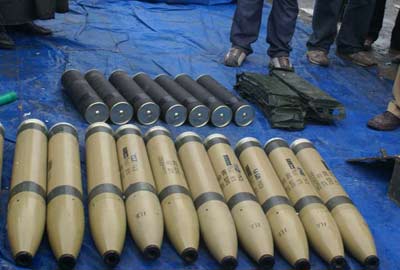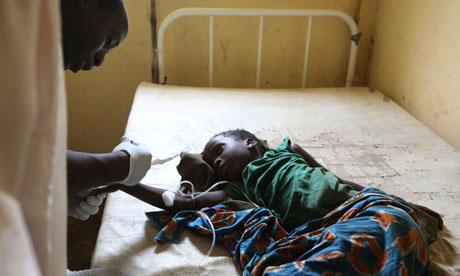By Daniel M. Austin
Impunity Watch Reporter, Africa

ABUJA, Nigeria- Nigeria officials continue to search through 13 shipping containers looking for additional weapons. It is believed the military-grade arms shipment originated in Iran. The Iranian embassy in Nigeria has not offered any explanation on the seized shipment and believes any response to this incident will only cause more confusion. Moreover, the embassy stated that no Iranian has been arrested in connection with the seizure. Israel officials believe the weapons were only passing through the Nigeria port and their final destination was the Hamas-controlled Gaza Strip. A Hamas spokesman has denied this charge.
For more information, please see:
Associated Press — Nigeria: Iran won’t discuss arms seizure — 1 November 2010
LAGOS, Nigeria – Nearly a month after militants detonated a string of car bombs killing 10 people in the capital, Abuja, Nigerian State Secret Services (SSS) intercepted thirteen shipping containers filled with weapons and explosives. Upon opening the first container, officials discovered a substantial cache of weapons and explosives. Officials are continuing to examine the other twelve containers and suspect they contain similar cargo. These weapons were discovered after increased security measure implemented in response to this recent terrorist attack. This find is especially troubling amid fears that violence could disrupt parliamentary and presidential elections scheduled for 2011.
Nigerian officials led journalists to a yard adjacent to the seaport Apapa Wharf in the costal city of Lagos to show them a portion of the recently discovered weaponry. Suspicion arose when the clearing agent offered any price necessary to ensure that the shipping containers were unloaded at an off-dock facility instead of at the port where security measures are more rigorous. Upon further inspection, the bill of lading falsely claimed that the shipping containers in question held construction materials, specifically floor tiles. However, security officials soon discovered the individual crates contained weapons. The munitions included rocket launchers, 107mm artillery shells, machine guns, grenades and other explosives. The SSS is continuing to search for other containers that may contain similar cargo. While the ownership of the shipping containers and their final destination are still not known, it is believed they were shipped from Iran
Several militant groups currently operate in Nigeria, and any one of them could be connected to this weapons shipment. The Movement for the Emancipation of the Niger Delta (MEND) claimed responsibility for the string of car bombs that exploded in the capital earlier this month. Furthermore, MEND has threatened more attacks, although their destructive capabilities may be hindered by the recent arrest of its top leaders. Along with MEND, the Boko Haram, a militant Islamic group, operating in the northeastern part of Nigeria, could also be linked to this weapon shipment. The Boko Haram recently attacked a police station, killing police officers and government officials. This brutal assault has led many to fear the group may be planning additional attacks.
For more information, please see:
BBC – Nigeria’s secret police intercept weapons shipment – 27 October 2010.
Canadian Press – Nigeria: Artillery rockets, rifle rounds included in weapons seized in shipping containers – 27 October 2010.
Nigerian Compass – SSS intercepts containers laden with rocket launchers – 27 October 2010.
Nigerian Tribune – Customs seize 13 containers of arms, ammunition in Lagos – 27 October 2010.
Reuters Africa – Nigerian secret service intercepts arms shipment – 27 October 2010.


